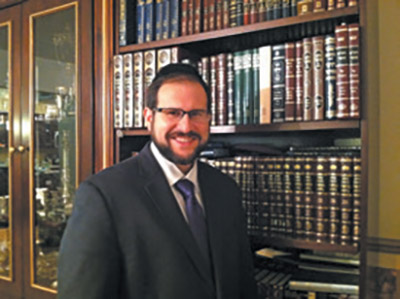
On November 9, in Heichal HaTorah, a group of students made a small model graffitied wall, symbolic of the Berlin Wall, which divided West and East Germany for decades. Then, in commemoration of “Berlin Wall Day,” the anniversary of the day when the Berlin War was dismantled on that day in 1989, they broke down their makeshift wall.
The dismantling of the Berlin Wall in 1989 came shortly after President Ronald Reagan’s famous quip to the Russian president: “Mr. Gorbachev, tear down this wall!” The wall’s destruction was symbolic of the imminent downfall of what was dubbed the “evil empire” and the Iron Curtain. Berliners used crowbars and chisels to tear down the wall built by the communist hammer and sickle. Families were reunified after decades of forced separation, and it was a great victory for democracy, with implications the world over.
Not all walls are detrimental, however, and dismantling of walls is not always cause for celebration. Nebuchadnezzar also proclaimed, “Tear down this wall” before his legions destroyed the walls surrounding Yerushalayim and the first Beis Hamikdash in 422 B.C.E. That same call was made by the wicked Titus when his Roman forces arrived to destroy the second Beis Hamikdash in 70 C.E.
When I was in Eretz Yisrael with my son Shalom a couple of years ago, we had the opportunity to head up north for a day. We drove from Yerushalayim toward the Galil alongside the Jordanian border. Along the entire length of the shared border there is a fence, and alongside the fence is sand—so that footprints can be easily detected. The entire perimeter of the fence is under 24-hour surveillance to protect against enemy infiltration. It’s incredible how much security and vigilance is necessary along the border of a (relatively) peaceful neighbor.
On a metaphysical level, the Jewish people erect spiritual boundaries between ourselves and the rest of the world. As we transition from the holiness of Shabbos to the weekdays each Motzei Shabbos, we bless Hashem “Who separates between holy and unholy, between light and darkness, between Yisrael and the nations…” As the wicked Bilaam admiringly declared, “Behold! They are a nation that dwells in solitude!”
Those divisional boundaries do not convey a lack of respect for everyone else. It’s no different from the walls and doors of our homes that preserve and ensure privacy, but are in no way an affront to our neighbors.
One of the most important protective barriers we erect are those of morality. The Shulchan Aruch mandates that we maintain certain boundaries between genders, such as the laws of yichud and negiah, aside for the laws of family purity within the privacy of our own homes. Any thinking person realizes that those laws do not denigrate women, but in fact accomplish the reverse. They are there to prevent the objectification of women, and to ensure that women are respected for who they are, not merely for how they look.
During the time of Syrian-Greek oppression, prior to the Maccabean revolt and the Chanukah miracles, Antiochus IV created an all-out assault against Jewish morality and family purity. Doors were forcibly removed from homes, violating the very concept of family privacy and modesty, circumcision, the symbol of self-control, was banned, and brides were forced to be violated by the local governor prior to their wedding. It was an egregious breach of the very foundation of our national holiness.
In Maoz Tzur we state that the Greeks “breached the walls of my towers,” a reference to the breaches they inflicted in the walls of modesty we try so hard to erect around ourselves. The celebration of Chanukah, therefore, is also a celebration and rededication to the laws that ensure morality and family purity.
In recent weeks, the American public has been stunned by the numerous accusations leveled by women against powerful and well-known moguls and famous personalities. The careers of the accused have been destroyed by the publicizing of the shameful and denigrating acts they committed against those women.
As we celebrate the beautiful Yom Tov of Chanukah, it’s an opportunity to emphasize to our children, and remind ourselves, that the laws of the Torah are there for our growth and greatness. Perhaps the Western World isn’t going to adhere to the laws of yichud and prohibition of negiah, but with all that’s going on, at least we should have an appreciation for the spiritual fences we invest so much to maintain.
By Rabbi Dani Staum
Rabbi Dani Staum, LMSW, is the rabbi of Kehillat New Hempstead, as well as a rebbe and the guidance counselor at Heichal HaTorah in Teaneck, New Jersey, Principal at Mesivta Ohr Naftoli of New Windsor, and a division head at camp Dora Golding. He also presents parenting classes based on the acclaimed Love and Logic methods. His email address is: stamtorah@gmail.com. His website is: www.stamtorah.info.











